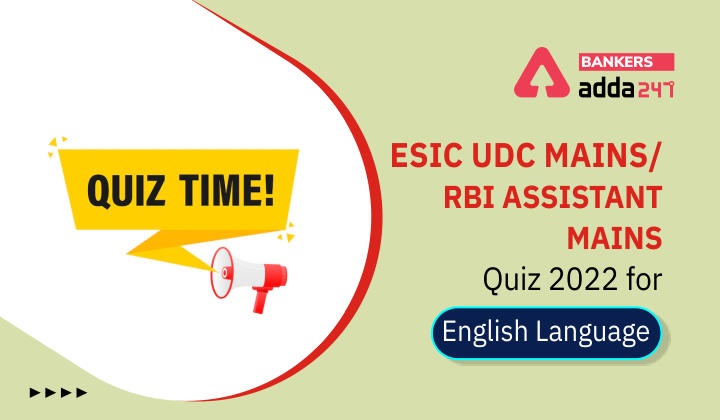Directions (1-10): For each question, five options are given out of which four options can be rearranged to form a coherent paragraph. Choose the sentence which fails to become a part of the coherent paragraph and is the odd-one-out.
Q1.
(a) Naturalistic observation traces its roots back to anthropology and animal behaviour research.
(b) Forest ecosystems are defined by a “salient” or common set of characteristics that make the forest ecology of a particular area unique.
(c) These very complex sets of forest conditions are studied by forest ecologists who try to isolate and classify the common structural patterns that continually reoccur in a particular forest’s environment.
(d) The perfect forest ecosystem is where simpler biotic communities live in the same approximate space with increasingly more complex biotic communities to each community’s benefit.
(e) In other words, it is where many individual biotic communities symbiotically live in “harmony” with other biotic communities in perpetuity for the benefit of all neighbouring forest organisms.
Q2.
(a) Putin is what political scientists call a personalist dictator because the centre of power in Russia is not a political party or the military but it’s him, personally.
(b) So, it is worth thinking about what policymakers might do to prevent future world leaders from following Putin’s example.
(c) The U.S. government, for example, continues to push for additional sanctions on Russia in response to news of Russian military atrocities, even though prior sanctions did not deter those abuses in the first place.
(d) Russia’s invasion of Ukraine presents foreign policymakers with few good options to punish Russian President Vladimir Putin, or to deter these types of aggressions in the future.
(e) Cyber operations are most effective in pursuing informational goals, such as gathering intelligence, stealing technology or winning public opinion or diplomatic debates.
Q3.
(a) Israeli Prime Minister Benjamin Netanyahu has only a razor-thin majority in one of the most right-wing Knessets in Israeli history.
(b) After days of protests by Palestinians calling for his release, and mounting fears in Israel of widespread unrest if he died in custody, the Israeli government yielded.
(c) He was hospitalized but refused medical treatment.
(d) Israel agreed to release him after Abu Hawash agreed to end a 141-day hunger strike he had carried out while imprisoned.
(e) In the coming weeks, Israel is slated to free Palestinian detainee Hisham Abu Hawash, a 40-year-old construction worker, who has been held by Israeli military authorities since October 2020 without charge or trial.
Q4.
(a) That’s how the ancients discovered five of the planets: Mercury, Venus, Mars, Jupiter and Saturn.
(b) The word “planet” came from the ancient Greek words that mean “wandering star.”
(c) Satellites provide civilian communications but also do the same for military units.
(d) That makes sense, because for thousands of years, people have watched planets change position in the night sky – unlike stars, which appear fixed and unmoving to the naked eye.
(e) Astronomers using telescopes found Uranus in 1781, Neptune in 1846, and Pluto in 1930.
Q5.
(a) That’s problematic for many reasons, including the abundant evidence that paid leave boosts healthy childhood development and economic security.
(b) Employers are free to provide federal paid leave benefit at their own expense.
(c) The U.S. remains the only advanced economy without federal paid leave, despite overwhelming support for this benefit.
(d) In normal times, as a compensation for higher risk, investors expect higher rates of interest for money they lend over a longer time horizon.
(e) But only 1 in 4 U.S. workers, including federal employees, can take paid time off to care for a new born or a newly adopted or fostered child.
Q6.
(a) There is clear evidence, for example, that poor mental health in the form of depression and anxiety is linked to reduced productivity, and how well you are able to do your job.
(b) However, the vast majority are local residents of countries and communities in crisis.
(c) You might imagine them as people who parachute into battlefields or places wrecked by disasters.
(d) Local aid workers around the world face many challenges, one of them being them increasingly becoming the strategic targets of attack for military forces.
(e) Professional humanitarian aid workers in war-torn places like Ukraine, Ethiopia, Syria and South Sudan do some of the most dangerous jobs in the world.
Q7.
(a) Unfortunately, the current Russia-Ukraine war has revealed that good will is no longer on all sides.
(b) Famines should be relegated to the history books, leading expert Cormac Ó Gráda argued in 2007, since “given good will on all sides, famine prevention should be ‘easy’”.
(c) Ukraine, known as the breadbasket of Europe, is struggling to export last year’s harvest, and may be unable to produce much this year either.
(d) The UN is warning that the ongoing Russian blockade of Ukraine’s grain exports may trigger a global food emergency that could lead to famines.
(e) At the same time, Ukraine’s resilience and a coordinated global response means the war is not ending as many expected before it began – with Russia’s swift victory.
Q8.
(a) From the joy of the human-animal bond, to companionship and improved mental health, there is no doubt that cats, dogs and other pets enhance our lives immeasurably.
(b) The ‘urban jungle’ may provide many routes to puzzle over and a dazzling array of landmarks to take stock of.
(c) It’s a longstanding and widely accepted fact that people of all ages can benefit from partnerships with animals as pets.
(d) Pet therapy is a relatively new phenomenon of therapy for humans, which involves animals.
(e) These animal assisted interventions (AAIs) – which also include a trained human professional – are proving beneficial to people of all ages, leading to significant reductions in physiological responses to stress – such as heart rate – and associated emotions, such as anxiety.
Q9.
(a) Western press outlets have referred to him as a “hero,” as the “voice” of his nation, and as a “focal point” for democratic resistance to tyranny.
(b) His speech to the European Parliament in early March received a standing ovation.
(c) Russian President Vladimir Putin justifies his war on Ukraine as a peacekeeping mission, a “denazification” of the country.
(d) His response to the Russian invasion of his country has been widely praised, both at home and abroad.
(e) Whatever happens in the coming weeks, President Volodymyr Zelenskyy will go down as the face of Ukrainian resilience during the Russian invasion of his country.
Q10.
(a) Heatwaves are bizarre at any time in Antarctica, but particularly now at the equinox as Antarctica is about to descend into winter darkness.
(b) Record-breaking heatwaves hit both Antarctica and the Arctic simultaneously this week, with temperatures reaching 47℃ and 30℃ higher than normal.
(c) Likewise, up north, the Arctic is just emerging from winter.
(d) The Arctic tundra is a vast, mostly treeless region stretching across the far northern areas of North America and Eurasia.
(e) We don’t know yet if these two heatwaves are linked and it’s most likely a coincidence.
Solutions
S1. Ans. (a)
Sol. The sequence ‘bcde’ makes a coherent paragraph which describes what a forest ecosystem is and the features that make up one.
Information provided by option (a) doesn’t gel well with the rest of the sentences and is the odd-one-out.
Hence, option (a) is the correct answer.
S2. Ans. (e)
Sol. The sequence ‘dcba’ makes a coherent paragraph which talks about possible ways through which the world can forgo witnessing another Putin come to power in the future.
Information provided by option (e) doesn’t gel well with the rest of the sentences and is the odd-one-out.
Hence, option (e) is the correct answer.
S3. Ans. (a)
Sol. The sequence ‘edcb’ makes a coherent paragraph which talks about an heinous crime committed by the Israeli military forces against a Palestinian detainee and his treatment at the hands of the authorities of the country.
Information provided by option (a) doesn’t gel well with the rest of the sentences and is the odd-one-out.
Hence, option (a) is the correct answer.
S4. Ans. (c)
Sol. The sequence ‘bdae’ makes a coherent paragraph which talks about the discovery of planets in the history since the 18th century till the 21st century.
Information provided by option (c) doesn’t gel well with the rest of the sentences and is the odd-one-out.
Hence, option (c) is the correct answer.
S5. Ans. (d)
Sol. The sequence ‘cbea’ makes a coherent paragraph which talks about the federal paid leave that U.S. citizens miss out on.
Information provided by option (d) doesn’t gel well with the rest of the sentences and is the odd-one-out.
Hence, option (d) is the correct answer.
S6. Ans. (a)
Sol. The sequence ‘ecbd’ makes a coherent paragraph which talks about the trials and tribulations of local aid workers who are the unsung heroes during the times of crisis.
Information provided by option (a) doesn’t gel well with the rest of the sentences and is the odd-one-out.
Hence, option (a) is the correct answer.
S7. Ans. (e)
Sol. The sequence ‘badc’ makes a coherent paragraph which talks about how the ongoing Russian occupation of Ukraine could lead to global food emergency that can in turn result in famines.
Information provided by option (e) doesn’t gel well with the rest of the sentences and is the odd-one-out.
Hence, option (e) is the correct answer.
S8. Ans. (b)
Sol. The sequence ‘deca’ makes a coherent paragraph which talks about the newly conceived concept of pet therapy.
Information provided by option (b) doesn’t gel well with the rest of the sentences and is the odd-one-out.
Hence, option (b) is the correct answer.
S9. Ans. (c)
Sol. The sequence ‘edba’ makes a coherent paragraph which lauds the gallant efforts of the Ukrainian President Volodymyr Zelenskyy in combating the Russian occupation of his country.
Information provided by option (c) doesn’t gel well with the rest of the sentences and is the odd-one-out.
Hence, option (c) is the correct answer.
S10. Ans. (d)
Sol. The sequence ‘bace’ makes a coherent paragraph which talks about heatwaves in the Antarctica and the Arctic regions.
Information provided by option (d) doesn’t gel well with the rest of the sentences and is the odd-one-out.
Hence, option (d) is the correct answer.





 GA Capsule for SBI Clerk Mains 2025, Dow...
GA Capsule for SBI Clerk Mains 2025, Dow...
 The Hindu Review October 2022: Download ...
The Hindu Review October 2022: Download ...
 SBI PO Syllabus 2025, Check Subject Wise...
SBI PO Syllabus 2025, Check Subject Wise...


